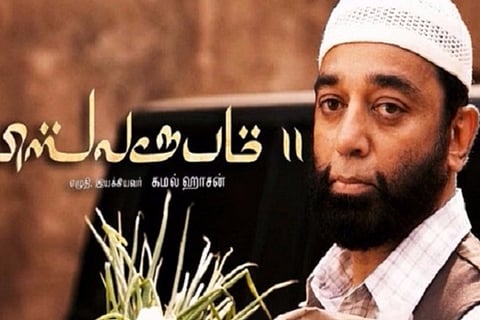

Kamal Haasan's Viswaroopam 2 is expected to release this year. The first film ran into trouble after protests that it was offensive to the Muslim community because it equated Islam with terrorism. Kamal has alleged that these protests were politically motivated and had nothing to do with religion
Ironically, Kamal was playing a Muslim man in the film, a religious identity that the heroes in Tamil films don't embrace too often.
Even if the film is about inter-religious love, like Bombay or Wagah, the hero does not usually take on the Islamic identity, it is the heroine who does so. It's easy to put her in a burqa and present her to the audience as an "exotic" and "mysterious" woman who makes the forbidden love story all the more exciting.
Thirumanam Ennum Nikkah had Jai playing the role of a Hindu man who pretends to be Muslim to win a woman's heart and in Rajinikanth's cult film Baasha, the superstar takes on a Muslim name after his friend Anwar Baasha is murdered by the villain, Antony (Raghuvaran). These are a few examples of the mainstream hero coming close to the religious identity, even if they aren't shown as Muslim men themselves.
The exceptions that one can think of are the 1995 Vijay film Chandralekha in which the actor played Rahim, a Muslim man in love with a Brahmin woman and Housefull (1999), in which Vikram plays a Muslim man stuck inside a theatre where terrorists have placed bombs. Arya appeared as Emaan in Ullam Ketkumey (2005), a campus romance with an ensemble cast.
The Good Muslim
This is not to say that Tamil cinema portrays Muslims in bad light. The Good Muslim stock character is quite popular, especially when the film is about terrorism or the director has a "message" about secularism for the audience.
In Nayagan, Sakthivel (Kamal) is raised by a Muslim man, a kind-hearted smuggler named Hussain, after he runs away from home and arrives in Dharavi. In Kuruthi Punal, once again a Kamal film, Arjun plays the second hero - a Muslim cop named Abbas who is the hero's best friend.
One of the most poignant scenes in Thalapathi is when Surya (Rajinikanth) is arrested when he's participating in the funeral procession of a Muslim child. Vijay Sethupathi's recently released Kavan, had a Muslim character called Abdul who makes a long speech about the patriotism of Indian Muslims. His earlier film, Dharma Durai, has a Muslim character who saves his life after once having been his enemy.
The politically correct Muslim
Then we've had the "politically correct" representations in films that deal with terrorism to balance out the stereotyping. So, Unnaipol Oruvan had Ganesh Venkatraman play a Muslim cop called Arif Khan; Prakash Raj in Vaanam was the good Muslim man whose wayward younger brother is involved in terrorist activity; National Security Guard Nawaz Khan (Bharath Reddy) was the counter to terrorist Yusuf Khan in Payanam.
We're never allowed to forget that these characters are Muslim because the film's only purpose in having them is to prove a point about religion - so they appear with skull caps, Islamic music playing in the background, offering prayers on a mat, or sharing their biryani with the hero. They might also have a sister in a tight salwar and veil to provide "atmosphere".
Muslim characters in Malayalam films
In complete contrast is the Malayalam industry where not only have the heroes played Muslim characters, supporting roles too are given a Muslim identity even if the plot doesn't demand it.
For instance, Koya from Premam, who plays George's (Nivin Pauly) friend is a Muslim but he doesn't walk around with a skull cap to announce his identity. There are no references to his religion - except a casual dialogue in which he says he's going to pray. The film doesn't make a big song and dance out of the fact that George (Christian), Shambu (Hindu) and Koya (Muslim) are best friends - because that's how secularism works in real life. You don't have to tom-tom it when all these identities are part of your cultural fabric.
Like other industries, Muslim heroes in Malayalam, too, have changed their names - Abdul Khader became Prem Nazir, Muhammad Kutty became Mammootty. However, this is more the case of an actor taking on a fancier stage name than hiding his religious identity to make himself more appealing to the audience - like Dilip Kumar in Bollywood or Arya and Shaam in Kollywood.
The two superstars of the Malayalam industry, Mammootty and Mohanlal, have comfortably played characters who belong to all three major religious faiths in the country. In fact, one of Mohanlal's most memorable roles is that of Ali Imran, an ex-cop who is called upon by the force to lead them in a tense hostage drama in Moonam Mura. And who can forget Abdulla (Mohanlal) from His Highness Abdulla?
One is not sure why this is the case - perhaps there are more people in the industry who are of Christian faith than there are of Muslim? Two top stars Vijay and Vikram are of Christian faith, for instance. Is Islamophobia a factor, too? Perhaps.
The representation of the Muslim character in Tamil cinema is often no more than well-meaning tokenism and this is unlikely to change in the near future. While it's encouraging that filmmakers want the audience to embrace secularism, it would be more convincing if they started treating communal harmony as a way of life than turn it into a theme with loud messaging. Not only will the "message" seep to the audience better, they will also unearth a wealth of stories and narratives that haven't made it to the screen yet.